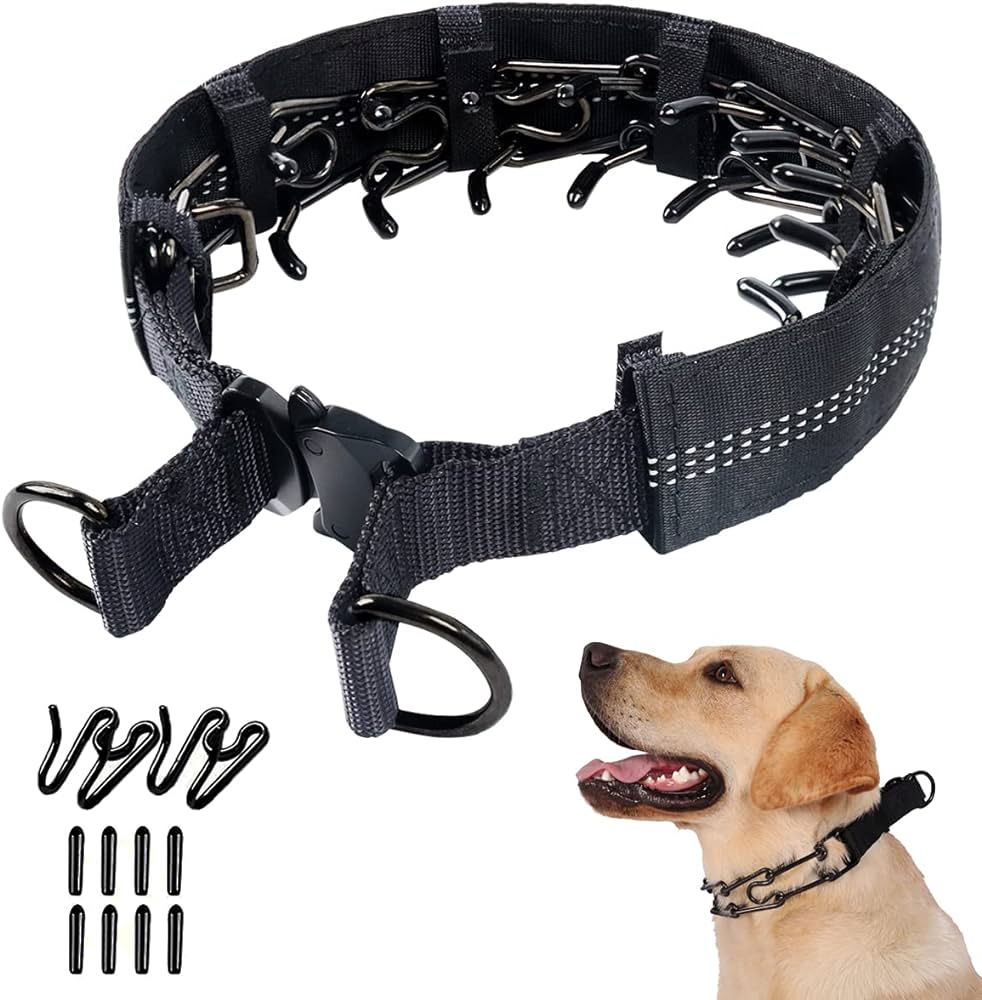 When it comes to training our beloved furry friends, it’s essential to choose methods and tools that promote positive reinforcement and ensure their well-being. While prong collars have their place in certain training scenarios, you might be interested in exploring gentle alternatives. In this article, we’ll take a relaxed and cheerful tone as we discuss alternatives to prong collars, focusing on training tools that prioritize comfort, safety, and positive reinforcement.
When it comes to training our beloved furry friends, it’s essential to choose methods and tools that promote positive reinforcement and ensure their well-being. While prong collars have their place in certain training scenarios, you might be interested in exploring gentle alternatives. In this article, we’ll take a relaxed and cheerful tone as we discuss alternatives to prong collars, focusing on training tools that prioritize comfort, safety, and positive reinforcement.
Martingale Collars:
Martingale collars are a popular choice for dog owners seeking a gentler option for training. These collars feature a fabric loop that tightens slightly when a dog pulls, preventing them from slipping out. Unlike prong collars, which rely on pressure, martingale collars provide a controlled tightening sensation without causing discomfort or pain.
Martingale collars are particularly suitable for dogs with necks wider than their heads, such as Greyhounds and Whippets. They offer excellent control and prevent escape without the potential risks associated with prong collars. Remember to always adjust the collar to ensure a proper fit and consult a professional trainer for guidance on proper usage.
Harnesses:
Harnesses are an excellent alternative to prong collars, especially for dogs prone to pulling on the leash. Instead of placing pressure on the neck, harnesses distribute the force evenly across the dog’s body. This helps prevent neck strain, tracheal damage, and discomfort.
There are various types of harnesses available, such as front-clip harnesses and back-clip harnesses. Front-clip harnesses attach the leash to the front of the dog’s chest, which tends to discourage pulling by redirecting their forward momentum. Back-clip harnesses are more versatile and suitable for dogs who have already mastered loose leash walking.
Harnesses are a gentle and comfortable option that promotes positive training experiences. They are particularly beneficial for dogs with respiratory issues, such as brachycephalic breeds, who may be more susceptible to injury when using prong collars or traditional collars.
Head Halters:
Head halters, such as the Gentle Leader or Halti, are an effective training tool that gently steers your dog’s head, redirecting their attention and controlling their movement. These halters fit over the nose and neck and provide control without exerting pressure on the throat or neck area.
The concept behind head halters is similar to that of a horse halter, allowing you to guide your dog’s movements by gently turning their head. Unlike prong collars, head halters do not rely on discomfort or pain to correct behavior. Instead, they provide a gentle and humane way to communicate and redirect your dog’s attention.
It’s important to note that head halters require proper fitting and gradual acclimation. Introducing your dog to the head halter slowly and positively, with treats and rewards, will help them associate it with positive experiences. Consulting with a professional trainer is recommended to ensure proper usage and to address any questions or concerns you may have.
Clickers and Treats:
Sometimes, the best training tools are not physical objects but rather the power of positive reinforcement. Clicker training, combined with treats, is a gentle and effective way to train your dog without the need for corrective tools like prong collars.
Clicker training involves using a small handheld clicker that makes a distinct noise when pressed. You pair the sound of the clicker with a reward, usually a treat, to mark desired behaviors. This method helps your dog associate the sound of the clicker with a positive outcome, encouraging them to repeat the behavior.
Clicker training allows you to shape your dog’s behavior gradually, rewarding them for small steps toward the desired outcome. It’s a fun and cheerful training method that strengthens the bond between you and your furry friend. Plus, it eliminates the need for tools that may cause discomfort or rely on correction.
In conclusion, there are plenty of gentle and effective alternatives to prong collars that prioritize comfort, safety, and positive reinforcement. Martingale collars, harnesses, head halters, and clicker training with treats all offer excellent options for training your dog without resorting to aversive tools.